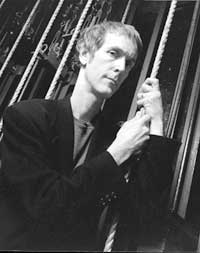A Foundation
for Success:
Oberlin Opera Theater
on the Fast Track with Director Jonathan Field
by Michael
Chipman
 |
|
Jonathon
Field, Director
Oberlin Opera Theater Photo by Matthew Sumner |
"I have worked with several apprenticeship training programs all over the nation, so I know what works and what is expected," says Oberlin Opera Theater director Jonathon Field. "I also keep an active directing schedule outside of Oberlin, so I can come back to students with up-to-date information on what is happening in the real world of opera."
Under Field's leadership, the Oberlin Opera Theater program is on the fast track as one of the best undergraduate training grounds for professional opera singers in the world. His years of professional experience in companies including San Francisco Opera, Lyric Opera of Chicago and Seattle Opera have given him a vision of producing students who are prepared for the demands of a professional singing career.
With two sold-out
opera seasons and rave reviews since he assumed the post of director
in 1997, Field is taking Oberlin Opera Theater to a new level. "In a
way I have made very few changes here," says Field. "I inherited a first
rate program from Judith Layng (opera theater director from 1979-1996)
and her predecessors." Even so, Field has revolutionized Oberlin Opera
Theater in many ways. His decision to perform all operas in their original
language -- a first for Oberlin -- is one part of Field's Five-Year
Plan, which he talked about in a recent interview.
 Why
did you decide to perform operas in their original language?
Why
did you decide to perform operas in their original language?
Have students risen to the task of singing in a foreign language?
 Last
year's production of "Così fan tutte" was triple cast -- two
performing casts and one cover cast. Why three casts?
Last
year's production of "Così fan tutte" was triple cast -- two
performing casts and one cover cast. Why three casts?
"Così" has a small cast, and when it came time for casting I had three separate groups of people who could all have done it. Since this is an academic institution. I thought the stage time and rehearsals would be valuable experience for them. It has paid off because some of the people from the cover cast are now doing roles in "Manon." On the other hand, it was very tough on vocal coach Alan Montgomery and assistant director Jennifer Bertoni.
Instead of triple casting this year I'm giving private readings with deserving students. For example, this fall I'm doing Menotti's one-act opera, "The Telephone" with one of my soprano students.
You have chosen operas from the standard repertoire for the program here. Is that a conscious choice?
Absolutely. Choosing pieces here is difficult. I can't do Wagner or Richard Strauss or a lot of the pieces I would really love to do because it would fry the voices and would not be a learning experience. I choose from the standard repertoire because that is what singers will perform outside, and it's always easier to play a role the second or third time around. I could do Paisello's "Barber of Seville," but they'd never use it again, where shows like "Manon" and "Don Giovanni" will always be useful in the real world.
Where do you see Oberlin Opera Theater in the grand scheme of professional opera?
My goal is to make this the kind of school that produces really fabulous graduate students at some of the best schools around, or prepares them to get into the best apprentice programs. We provide the training ground that will prepare them for the next step. Along with dramatic training, I try to provide the expectations of professional life, so they will be prepared for every aspect of working as a professional singer.
|
Meet the people behind the scenes:
|
Michael Chipman, a second-year artist diploma student, studies voice with Richard Miller. Chipman received a B.A. in English Literature from Utah State University. He has sung professionally with Cincinnati Opera, Utah Opera, Lyric Opera Cleveland, and has soloed with the Utah Symphony, Honolulu Symphony and the Utah Chamber Orchestra. Chipman worked as a missionary in Brazil from 1991-93.
